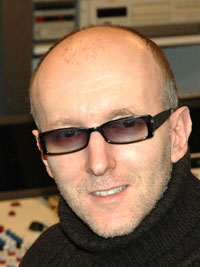
![]()
producer, mixer and engineer
More producers: Chips Kiesbye
In 1982 Henryk founded Music A Matic Studio as a home base for his own musical projects. As early as 1984, the studio was computerized with two Atari computors. Ever since, Music A Matic has combined digital sound processing with classic recording technics and the superior sound of vintage equipment.
Indie by heart and with his roots in kick-ass-rock'n roll, Henryk has long experience of all kinds of musical and recording experiments. "I record anything that sounds", Henryk says.
He loves to record bands live in the studio to get the music feel right. Henryk collects all kind of vintage equipment, including lots of keyboards, and when mixing he uses seven different mixers with a total of 110 vintage signal paths.
How long have you been working as a producer?
We built the Music A Matic studio back in 1982. This wa kind of a rough
industrial neighbourhood when we started. Besides us and some bands, there
was a MC club and a punk rock club here. Talk about a culture clash, but
as long as we kept the party’s separate we got along fine.
Why did you start your own studio?
The band I was in at the time had just recorded an album in an expensive
studio with a famous producer. The result was so depressing that it pissed
med off. I thought – why not build your own studio and record the
music for your self? It can’t get any worse. Since then I’ve
been working as a technician and producer, initially only with my own
projects, but gradually more and more with other bands.
I’ve heard that you are collecting
old microphones?
I collect everything that sounds – organs, synths, microphones,
tape echoes … I’m not a collector in the true sense, I just
get the tools that enable me to express myself the way that I feel. I
decided really early on that tube gear was my thing. At that time most
people felt that it belonged in the museum or in the scrap yard. The trick
was to be there when the radio and TV stations threw it all out. It was
the same thing with the ribbon microphones. I could get them for close
to nothing since people felt they were noisy and had low output. There’s
always a new fab, especially when it comes to gear. People don’t
take the time to really listen and form their own opinion. You have to
stay cool and be one step ahead.
What are your favourite microphones?
I use most of my microphones regularly and can’t say that I have
one special favourite. When I get one it’s always because it has
a special sound that’s right for a certain kind of session. There’s
only one microphone that I’ve bought because of it’s name;
Lipp Coles. Guess why.
What is your vision of the perfect sound?
If I can make the band happy, get the fans to rush to stores at the same
time as I’ve managed to create a unique sound that makes you lose
your breath– then I’ve done it right. The trick is to make
the most of it without losing the artist's vision.
What bands have you worked with so far?
Blue For Two (own group together with Freddie Wadling)
Marie and The Wildwood Flowers
Texas Instruments
C M von Hausswolff
Stonefunkers
Cortex
Union Carbide prod.
Joakim Tåström
Magnus Karlsson (Weeping Willows)
Håkan Hellström
Sator
The Facer
Turpentines
50 Times The Pain
The Sorayas
Her Majesty
The Pusjkins
Millencollin
Burst
D.A.D
And many others.
What about the future in recording?
A good song is a good song and the artist must be convincing. Record it
with the best gear you got and mix it with a lot of attitude. Nothing
can make me believe that these truths are less relevant today, and tomorrow
then they’ve been since the modern form of recording started.
What do you think about old versus new
technology?
The technology, old or new, is just another instrument. If you learn to
play it well you can create wonderful music. I personally prefer a bit
of both. I use ProTools with loads and loads of plug-ins, and outboard
it to seven analogue mixers with a total of 110 channels. Combined with
the use of a lot of new and old compressors and equalizers I get an explosive
mix that can satisfy even the most fastidious.
Your dream client?
A new band that I love which will strike the world with awe.
How important is the mix and what's your
approach?
I learn to record when I mix, and the other way around. To be able to
get a great mix I have to focus on the whole recording process. When I’m
able to detect the decisive elements in a session before the actual recording
it brings a calm and a stability to the artist and the recording process.
Besides the quality and execution of the song, the mix is the most important
part of the whole recording process.
![]()